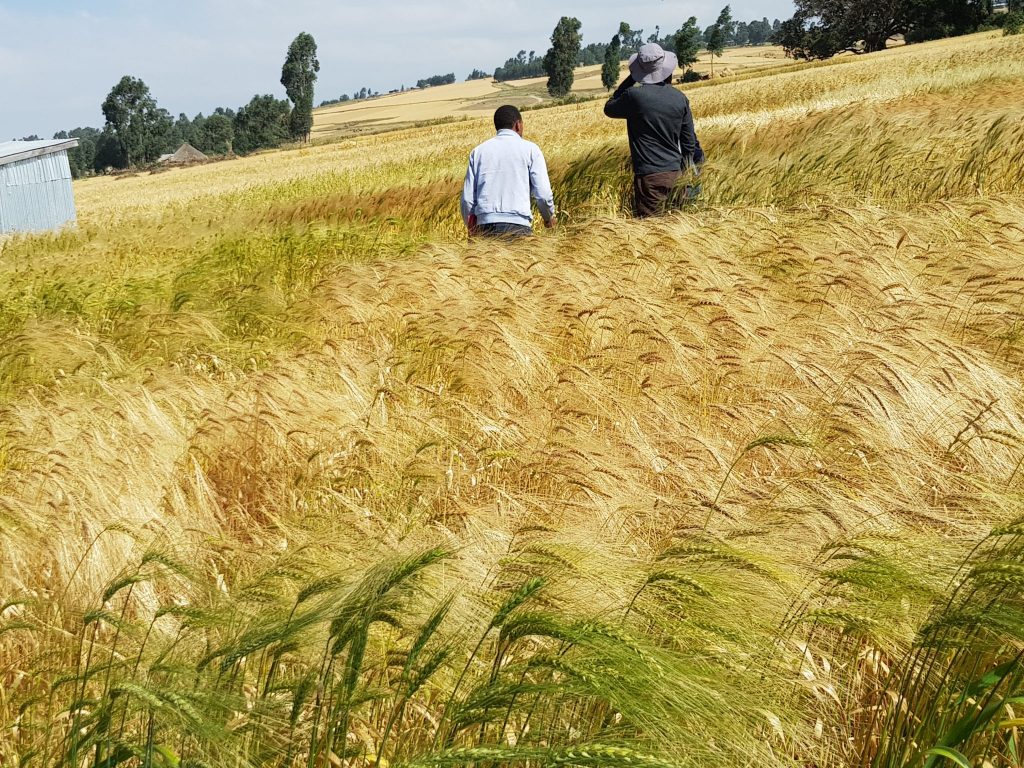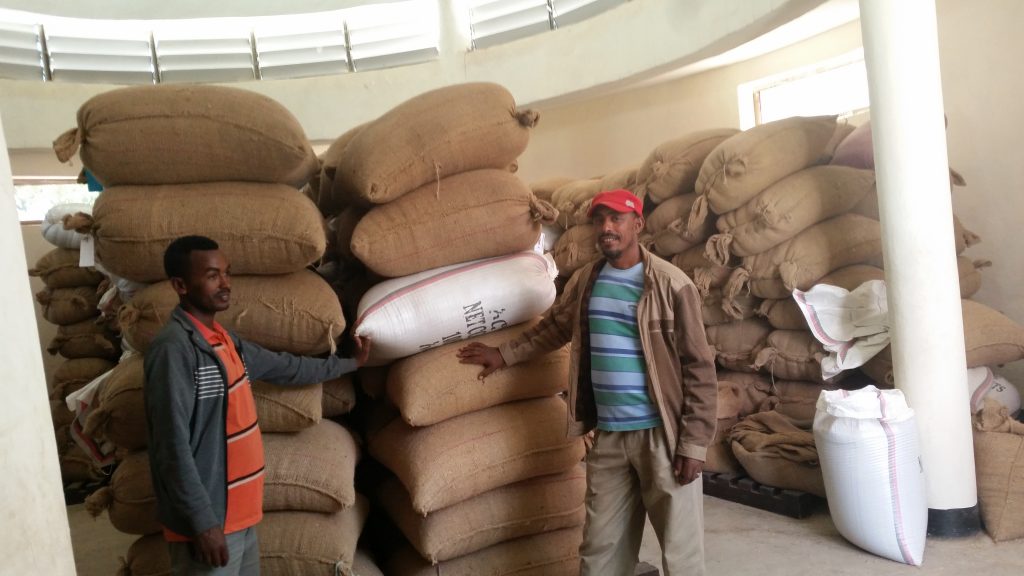As the Ethiopian government controversially opens the country to genetically modified crops, now is the time for newly unshackled civil society voices to lead the debate, says Noragric PhD Fellow Teshome Hunduma.

A coalition of Ethiopian Civil Society Organizations and their global allies have launched a campaign against the cultivation of Genetically Modified Organisms in Ethiopia.
The public outcry started when United States Department of Agriculture (USDA) Foreign Agricultural Service published a report that revealed that the government had approved commercial cultivation of genetically modified (GM) insect-resistant cotton (Bt-cotton) and confined trial of GM enset and maize in Ethiopia.
In 2015, the Ethiopian parliament opened up the country to genetically modified organisms (GMOs) by loosening the safeguards built into a 2009 biosafety law. Three years later, the government approved commercial cultivation of a strain of cotton.
Despite this, there has been limited public debate or media coverage. Yet, the moves broke with decades of Ethiopian public policy and have major implications for Africa as a whole.
The Ethiopian approach was praised in the above-mentioned report published in February 2020: “approval of commercial cultivation of genetically modified (GM) insect-resistant cotton (Bt-cotton) and confined field trail on GM maize can be taken as an effort to improve agricultural productivity using modern agricultural tools.”
Pleased with the government’s deeds, the report went on to state that the country’s “adoption of Bt-cotton not only has [high] economic importance but [is] also expected to have [a] positive influence on the acceptance of this technology in the region.”
Criticizing the government for its past precautionary approach to GMOs, the report says Ethiopia is now on track “especially considering that a decade ago the country was at the forefront of the anti-GMO movement in Africa.”
The USDA’s appreciation of Ethiopia’s policy change may well be driven by a strategic interest for the U.S. and its multinationals to use Ethiopia as a springboard to expand GMO cultivation in Africa.
Despite GMO establishment of various crops in South Africa since the late 1990s, expansion elsewhere on the continent has thus far been restricted to four out of the 47 countries, and with the exception of South Africa, limited to Bt cotton. However, there are indications that this may change. While recent droughts have led Zambia and Zimbabwe to lift bans on importation of GM maize for consumption, Ethiopia, Rwanda and Uganda seem to be the new target countries for expanding GM production. Uganda has allowed trials for genetically modified banana in last few years. Rwanda is considering opening up to genetically modified potato.
Bio-strategic
As the home of the African Union diplomatic community, Ethiopia is a particularly strategic country to promote GMO expansion on the continent.
For example, a 2016 field visit to a Bt-cotton field trial in Werer in Afar region of Ethiopia counted multi-lateral organizations such as New Partnership For Africa’s Development (NEPAD) Agency and African Biosafety Network of Expertise (ABNE) among its attendants. Furthermore, Addis Ababa has hosted the African Union’s African Seed and Biotechnology Programme since 2008. In this manner, Ethiopia may prove to be a more effective springboard than South Africa has been.
Two scenarios are possible to envisage. On the one hand, given Ethiopia’s role as a Pan-African leader, the opening up of Ethiopia to GMOs can lead to similar policy shifts elsewhere, as hoped for by the USDA. On the other hand, Ethiopia’s Pan-African reputation and leadership can be questioned by those who are aware of the potential risks GMOs pose for the environment, as well as the negative implications of the control of agricultural inputs by a few multinationals.
Prior to 2015, Ethiopia resisted the use of GMOs for many years, taking a keen interest in global environmental negotiations and playing a key leadership role within the African Group. Among others, Ethiopia, through its former chief negotiator, Dr. Tewolde Berhan Gebre Egziabher, played a key role in the international negotiations that led to the Convention on Biological Diversity’s Cartagena Protocol on Biosafety, which was adopted in 2000 and entered into force in 2003.
The protocol was hailed by African countries and environmental groups as an international mechanism to protect the safety of the environment, human health and the quality of socio-economic and cultural conditions from potential risks arising from use of GMOs. Many African countries rushed to sign and ratify the Protocol and developed restrictive national laws to domesticate it, using precautionary principles as a fundament.
Laws and leadership
As a foundation for its GMO regulatory system, in 2009 Ethiopia enacted a highly restrictive biosafety law that prohibited the deliberate release of GMOs into the environment. By passing this law, Ethiopia proved to itself and to crop diversity enthusiasts and scientists like Dr Melaku Worede that it was protecting its uniquely high crop diversity from GMO contamination and genetic erosion.
Furthermore, this was in harmony with a law (Proclamation No.123/1995) prohibiting patents on plants and animals and a law (Proclamation No. 481/2006, later amended to Proclamation No.1068/2017) establishing farmers’ rights to save, re-use, exchange and sell seeds of all kinds from their produce.
On the ground, Ethiopia has the biggest national genebank in Africa, which was established in 1976. As of June 2019, the national genebank in Addis Ababa has conserved about 86,599 samples of seeds of over 100 species of plants (mainly food crops) that have been collected from all over the country. In two field genebanks, the country has conserved 5,644 samples of coffee plants.
Ethio-Organic Seed Action Community Seed Bank site in Heexosa district, Arsi for re-introduction of traditional varieties of durum wheat from national genebank; Teshome Hunduma
The restrictive laws in Ethiopia were developed to protect smallholder farmers from becoming indebted to and dependent on multinational corporations for seeds. The multinationals enjoy the privilege offered to them by the World Trade Organization (WTO)—of which Ethiopia is only an aspiring member—to control the agricultural inputs including seeds through global markets and international rules, e.g., patents on GMO seeds.
Farmers are not allowed to re-use patented GMO seeds saved from their harvest and must instead buy seeds from the companies every planting season. The multinationals can even sue farmers if they find genes from their patented GMO seeds (e.g. maize) in farmers’ fields.
This is against the “‘polluter pays principle”, where companies whose GMOs contaminate farmers’ fields are supposed to compensate farmers. This was what the government aimed to avert by passing the highly restrictive 2009 biosafety law on the process for approving genetically modified crop cultivation. The USDA report described Ethiopia as the “vanguard of [the] anti-GMO movement in Africa by working with [the] African Union and drafting the restrictive African Model law” for its actions.
This is not a new accusation as the Ethiopian chief negotiator has been through several hurdles, the lessons of which he used to teach many Africans how international actors put aside Africa’s interests and advance theirs. In contrast to such accusations, environmental groups and African countries hailed the Ethiopian leadership for farsighted action to promote environmental sustainability. The government’s recent opening up of the country to GMOs is degrading this reputation.
Unfertile soil
Since the mid-2000s, as a precursor to the recent liberalization of Ethiopia’s GMO regulations, there has been intensified promotion of commercial seed market development through private entry into the business, especially for hybrid maize seeds. This is supported by the government’s Agricultural Transformation Agency (ATA) and the Alliance for a Green Revolution in Africa as well as their funders such as the Bill and Melinda Gates Foundation and the United States Agency for International Development (USAID). Extensive documentation has been made on how these actors’ work and support the commercial cultivation of GMOs in Africa and Ethiopia.
Ethiopia has a lot to thank these actors for. Through ATA, they supported capacity building of its public research and seed sector institutions. ATA managed to wake the Ministry of Agriculture’s apparatus up from a decades-long deep sleep. They developed strategies and set clear objectives for the Ministry. Consequently, agricultural research and the formal seeds system have improved in many ways during the last 10 years.
However, the formal seed sector in Ethiopia continues to report considerable barriers to the uptake of improved seeds, and seed wastage at public seed enterprises and farmer Union stores has been a common occurrence. Although this is due to many factors such as institutional ineffectiveness, high seed price is one of the major factors that discourages smallholder farmers from investment in improved seeds. One may wonder then how these farmers might afford expensive patented GMO seeds from multinationals. Even in South Africa, where maize is the main staple and 90% of marketed maize is GM, smallholder farmers have been slow to adopt GM maize.
Research shows that GM seeds are out of reach for smallholder farmers in most of Africa. It is simply too costly and too risky. Especially in the context of climate change and the tiny landholdings in countries like Ethiopia. So, who will they be selling GMO seeds to? Big new commercial actors in regions such as Gambella? Or is it hoped to be a means of credit and input provision for smallholders? If so, will crop insurance be similarly provided, in case of failure? With so much unknown, it is worrisome.
False claims
In 2015, when the parliament made the amendment of the law, and the main argument was to allow Bt-cotton to meet the growing textile industry in Ethiopia. Prior to the amendment, the same argument was used by the GMO actors to push for changing the 2009 biosafety law. However, there were no solid justifications for expanding genetic modification to indigenous crops such as enset.
According to the USDA report, Ethiopia has also approved a confined field trail of disease-resistant enset (Ensete ventricosum) in addition to genetically modified maize and commercial cultivation of Bt-cotton. Enset, commonly called “false banana” is a native crop to Ethiopia. Together with teff (Eragrostis tef) and coffee (Coffea arabica), enset constitutes the country’s cultural keystone crop species with which Ethiopian cultural identity and economy is strongly linked. As noted in USAID factsheet , the U.S. actors are keen on developing GMO versions of African indigenous crops. Patent follows genetic modification.
The attempt for genetic modification on enset could be an effort to patent the plant and get control of the Ethiopian raw mince dish kitfo, which is eaten with kocho—not to enhance enset production. The bacterial wilt disease problem is evident among enset farmers in Ethiopia. But the solution lies on simple knowledge-based strategies and awareness-raising campaign among growers to mitigate disease spread and management than an expensive and risky technology that doesn’t fits the condition of smallholders.
An attempt to genetically modify and release enset for commercialization requires a high-level of precaution. This is important because there are no independent studies which show improved yield, disease-resistance nor socio-economic benefits for smallholder farmers from use of genetically modified crops compared to conventionally bread varieties.
For example, Bt-cotton failed in Burkina Faso due to loss over time of its insect-resistant traits and yield potential. This has incurred economic losses for farmers due to high prices for seeds and associated agrochemicals. Besides, farmers were not able to use the seeds for food due to lack of confidence about its safety for their health. Similar experiences have been documented in India.
Regulatory weakness
Even more troubling is the weakness of Ethiopia’s regulatory system, as many people are already consuming genetically modified foods without knowing what they buy from stores. According to the USDA report “Ethiopia does import processed agricultural products such as soybean and corn oils, as well as breakfast cereals made from GM ingredients.” The report adds, “some food aid commodities, like corn-soy blend, which are GM products [used] for school feeding and humanitarian programs, [are] allowed to come to the country under a special waiver.”
This clearly shows a regulatory vacuum and lack of accountability to inform the public on the kind of foods they buy from suppliers. Before introducing GMOs to Ethiopian agriculture, a strong regulatory system should be in place, public research should be improved, and studies of GMOs’ socioeconomic values should be conducted by an independent body.
The effective dissemination of conventionally bred, well-adapted crop varieties coupled with good agronomic practices can improve crop production and productivity among Ethiopian smallholders without the need for GMOs. For this to happen, mistrust, and the imbalance in the agronomist–farmer knowledge exchange must be tackled. The critical problem in Ethiopia is the dogmatic condescension towards smallholders, and an uncritical faith in techno-scientific solutions, that is rampant within government agricultural institutions.
The U.S. positivity about Ethiopia’s adoption of GMOs is unfounded. If Ethiopia does not demonstrate why the benefits of GMOs for African smallholder farmers and industry exceed the risks, it will lose its Pan-Africanist leadership position in the environmental issues. A couple of decades after the Adwa victory, in the 1920s a West African nationalist newspaper stated that, “… when we speak of our prospects, we speak of the prospect of the entire Ethiopian race. By the Ethiopian race we mean the sons and daughters of Africa scattered throughout the world.”
Ethiopia is a symbol of independence and resistance against colonialism in Africa and has earned a reputation for organizing African unity in many areas including the NEPAD, and the Comprehensive Africa Agriculture Development Programme (CAADP).
Democratic test
It may appear that Ethiopia will lead GMO adoption as the U.S. hopes. But the reality is that Africans know that GMOs are not welcome in many parts of the world, including by member states of the European Union and European Free Trade Association member states. ‘Why in Africa? will be many people’s question. And it is this question that will undermine Ethiopia’s position as a Pan-African leader on environmental issues.
Moreover, I would like all of us to ask why this happening right now? This is a vulnerable time for Ethiopia during transition to democracy. The experience of South Africa approving GM crops almost immediately upon its own transition to democracy in the late 1990s demonstrates that such periods of uncertainty may be used to make hasty decisions without due consultation and public oversight. Transparency about the decision-making process is important.
After coming to power, Prime Minister Abiy Ahmed encouraged all sectors of society to contribute and participate in public debate and policy-making. I did my part. So are Civil Society Organizations (CSOs) in Ethiopia. Last week, a coalition of 11 Ethiopian CSOs together with their global allies (40 organizations) launched a campaign against cultivation of GMOs.
Their message was loud and clear.
“The institutions that are set up to protect us from risks arising out of the planting and use of GMOs are not equipped to protect the health of the people and the environment. We ask the Ethiopian government to institute a moratorium, of no less than five years, on any GMO field trials and any commercial planting until the proper institutional and regulatory mechanisms are set up, and a proper public consultation process has been held.”

This is a litmus test for democracy and civil society participation in public policy making in Ethiopia, specifically of the implementation of Ethiopia’s new Organizations of Civil Societies Proclamation. Passed in March 2019, the new proclamation repealed and replaced the 2009 Charities and Societies Proclamation which put severe restrictions on the ability of Ethiopian CSOs to work on democracy and human rights issues.
This was done by prohibiting them from receiving more than 10 percent of financing from abroad if they worked in certain areas such as human rights and democracy promotion. The reopening of civic space under the new proclamation was hailed by human rights organizations, although some concerns remain about the framework.
The campaign launched by the coalition of Ethiopian CSOs and their allies is a reminder to the Ethiopian government not to make a historic mistake that would have consequences for biodiversity, public health, and the socio-economic conditions of smallholder farmers across the continent.
The Environment, Forest and Climate Change Commission (EFCCC), which is mandated to implement the current biosafety law has been quiet on the GMO issue. However, several technocrats who work directly with GMO-promoting international actors have already spoken to mainstream media outlets, denied the facts published in the USDA report, and started intimidating those who expressed their concern in a civil manner.
More troubling is that the Ethiopian Biotechnology Institute has started the same strategy of denial, insult and intimidation on its Facebook page. This is a public institution financed by taxpayer money. Under these conditions, it is difficult to see how all sectors of society can contribute and participate in public debate and policy-making, as promised by Prime Minister Abiy.
This echoes worrying trends elsewhere. Debates on GMOs across the globe have suffered from high levels of polarization, often disintegrating into a battle between modernization and farmers’ rights. In reality, smallholder farmers’ interests and needs often lie somewhere in between. Ethiopia now has the opportunity to show global leadership by bridging this divide. To do this, Ethiopia must nurture a respectful and balanced debate that can be the foundation of a much-needed institutional framework to regulate GMOs.
Also posted in Ethiopia Insight
____________

Teshome Hunduma is a PhD Fellow at NMBU’s Department of International Environment and Development Studies, Noragric where he focuses his research on crop diversity and seed systems.



